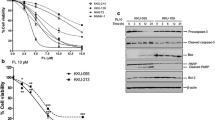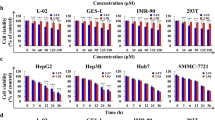Abstract
Chemotherapy is a palliative treatment for unresectable patients with cholangiocarcinoma (CCA). However, drug resistance is a major cause of the failure of this treatment. Derrischalcone (DC), a novel chalcone isolated from Derris indica fruit, has been shown pharmacologically active; though, the effect of DC on CCA is unknown. The present study investigated the cytotoxic, antiproliferative, anti-migration, and anti-invasion effects and underlying mechanisms of DC on CCA KKU-M156 and KKU-100 cells. Cytotoxicity and apoptosis were evaluated by acridine orange and ethidium bromide fluorescent staining. Reactive oxygen species (ROS) was measured by dihydroethidium assay. Cell proliferation and reproductive cell death were assessed by sulforhodamine B staining and colony-forming assay. Migration and invasion were determined by wound healing and transwell chamber assays. Protein expressions associated with cell death, proliferation, migration, and invasion were analyzed by western immunoblotting. We found that DC induced cytotoxicity and apoptosis in association with ROS formation and oxidative stress. Treatment with N-acetylcysteine suppressed ROS formation and attenuated DC-induced cytotoxic and apoptotic effects. DC increased the expression of p53, p21, Bax, and cytochrome c proteins in association with cell death. DC-induced antiproliferation, colony formation, anti-migration, and anti-invasion were associated with the suppression of Akt/mTOR/cyclin D1 and FAK signaling pathways. These findings suggest that the multi-targeting strategies with DC may be a novel treatment for cancer therapy.







Similar content being viewed by others
Data availability
All data generated or analyzed during this study are included in this published article.
References
Banales JM, Cardinale V, Carpino G, Marzioni M, Andersen JB, Invernizzi P, Lind GE, Folseraas T, Forbes SJ, Fouassier L, Geier A, Calvisi DF, Mertens JC, Trauner M, Benedetti A, Maroni L, Vaquero J, Macias RI, Raggi C, Perugorria MJ, Gaudio E, Boberg KM, Marin JJ, Alvaro D (2016) Expert consensus document: cholangiocarcinoma: current knowledge and future perspectives consensus statement from the European Network for the Study of Cholangiocarcinoma (ENS-CCA). Nat Rev Gastroenterol Hepatol 13:261–280
Buranrat B, Prawan A, Kukongviriyapan U, Kongpetch S, Kukongviriyapan V (2010) Dicoumarol enhances gemcitabine-induced cytotoxicity in high NQ01-expressing cholangiocarcinoma cells. World J Gastroenterol 16:2362–2370
Chen J (2016) The Cell-cycle arrest and apoptotic functions of p53 in tumor initiation and progression. Cold Spring Harb Perspect Med 6:a026104
Chen D, Lin X, Zhang C, Liu Z, Chen Z, Li Z, Wang J, Li B, Hu Y, Dong B, Shen L, Ji J, Gao J, Zhang X (2018) Dual PI3K/mTOR inhibitor BEZ235 as a promising therapeutic strategy against paclitaxel-resistant gastric cancer via targeting PI3K/Akt/mTOR pathway. Cell Death Dis 9:123
Chipuk JE, Fisher JC, Dillon CP, Kriwacki RW, Kuwana T, Green DR (2008) Mechanism of apoptosis induction by inhibition of the anti-apoptotic BCL-2 proteins. Proc Natl Acad Sci U S A 105:20327–20332
Decharchoochart P, Suthiwong J, Samatiwat P, Kukongviriyapan V, Yenjai C (2014) Cytotoxicity of compounds from the fruits of Derris indica against cholangiocarcinoma and HepG2 cell lines. J Nat Med 68:730–736
Franken NA, Rodermond HM, Stap J, Haveman J, van Bree C (2006) Clonogenic assay of cells in vitro. Nat Protoc 1:2315–2319
Hauck CR, Hsia DA, Schlaepfer DD (2002) The focal adhesion kinase—a regulator of cell migration and invasion. IUBMB Life 53:115–119
Jaidee R, Kongpetch S, Senggunprai L, Prawan A, Kukongviriyapan U, Kukongviriyapan V (2020) Phenformin inhibits proliferation, invasion, and angiogenesis of cholangiocarcinoma cells via AMPK-mTOR and HIF-1A pathways. Naunyn Schmiedebergs Arch Pharmacol 393:1681–1690
Jandial DD, Blair CA, Zhang S, Krill LS, Zhang YB, Zi X (2014) Molecular targeted approaches to cancer therapy and prevention using chalcones. Curr Cancer Drug Targets 14:181–200
Khan AS, Dageforde LA (2019) Cholangiocarcinoma. Surg Clin North Am 99:315–335
Khuntikeo N, Titapun A, Loilome W, Yongvanit P, Thinkhamrop B, Chamadol N, Boonmars T, Nethanomsak T, Andrews RH, Petney TN, Sithithaworn P (2018) Current perspectives on opisthorchiasis control and cholangiocarcinoma detection in Southeast Asia. Front Med (lausanne) 5:117
Klungsaeng S, Kukongviriyapan V, Prawan A, Kongpetch S, Senggunprai L (2020) Targeted modulation of FAK/PI3K/PDK1/AKT and FAK/p53 pathways by cucurbitacin B for the antiproliferation effect against human cholangiocarcinoma cells. Am J Chin Med 48:1475–1489
Kongpetch S, Jusakul A, Ong CK, Lim WK, Rozen SG, Tan P, Teh BT (2015) Pathogenesis of cholangiocarcinoma: from genetics to signalling pathways. Best Pract Res Clin Gastroenterol 29:233–244
Logue JS, Morrison DK (2012) Complexity in the signaling network: insights from the use of targeted inhibitors in cancer therapy. Genes Dev 26:641–650
Lopez J, Tait SW (2015) Mitochondrial apoptosis: killing cancer using the enemy within. Br J Cancer 112:957–962
Nair S, Li W, Kong AN (2007) Natural dietary anti-cancer chemopreventive compounds: redox-mediated differential signaling mechanisms in cytoprotection of normal cells versus cytotoxicity in tumor cells. Acta Pharmacol Sin 28:459–472
Ranjan A, Ramachandran S, Gupta N, Kaushik I, Wright S, Srivastava S, Das H, Srivastava S, Prasad S, Srivastava SK (2019) Role of phytochemicals in cancer prevention. Int J Mol Sci 20:4981
Roy-Luzarraga M, Hodivala-Dilke K (2016) Molecular pathways: endothelial cell FAK-A target for cancer treatment. Clin Cancer Res 22:3718–3724
Samatiwat P, Prawan A, Senggunprai L, Kukongviriyapan U, Kukongviriyapan V (2016) Nrf2 inhibition sensitizes cholangiocarcinoma cells to cytotoxic and antiproliferative activities of chemotherapeutic agents. Tumour Biol 37:11495–11507
Shan YS, Hsu HP, Lai MD, Hung YH, Wang CY, Yen MC, Chen YL (2017) Cyclin D1 overexpression correlates with poor tumor differentiation and prognosis in gastric cancer. Oncol Lett 14:4517–4526
Sompakdee V, Prawan A, Senggunprai L, Kukongviriyapan U, Samathiwat P, Wandee J, Kukongviriyapan V (2018) Suppression of Nrf2 confers chemosensitizing effect through enhanced oxidant-mediated mitochondrial dysfunction. Biomed Pharmacother 101:627–634
Surh YJ, Kundu JK, Na HK (2008) Nrf2 as a master redox switch in turning on the cellular signaling involved in the induction of cytoprotective genes by some chemopreventive phytochemicals. Planta Med 74:1526–1539
Trachootham D, Alexandre J, Huang P (2009) Targeting cancer cells by ROS-mediated mechanisms: a radical therapeutic approach? Nat Rev Drug Discov 8:579–591
Tuponchai P, Kukongviriyapan V, Prawan A, Kongpetch S, Senggunprai L (2019) Myricetin ameliorates cytokine-induced migration and invasion of cholangiocarcinoma cells via suppression of STAT3 pathway. J Cancer Res Ther 15:157–163
Tusskorn O, Prawan A, Senggunprai L, Kukongviriyapan U, Kukongviriyapan V (2013) Phenethyl isothiocyanate induces apoptosis of cholangiocarcinoma cells through interruption of glutathione and mitochondrial pathway. Naunyn Schmiedebergs Arch Pharmacol 386:1009–1016
Wandee J, Prawan A, Senggunprai L, Kongpetch S, Tusskorn O, Kukongviriyapan V (2018) Metformin enhances cisplatin induced inhibition of cholangiocarcinoma cells via AMPK-mTOR pathway. Life Sci 207:172–183
Wandee J, Prawan A, Senggunprai L, Kongpetch S, Kukongviriyapan V (2019) Metformin sensitizes cholangiocarcinoma cell to cisplatin-induced cytotoxicity through oxidative stress mediated mitochondrial pathway. Life Sci 217:155–163
Wang W, Wen Q, Xu L, Xie G, Li J, Luo J, Chu S, Shi L, Huang D, Li J, Fan S (2014) Activation of Akt/mTOR pathway is associated with poor prognosis of nasopharyngeal carcinoma. PLoS ONE 9:e106098
Yadav PP, Ahmad G, Maurya R (2004) Furanoflavonolds from Pongamia pinnata fruits. Phytochemistry 65:439–443
Zhou X, Zhou R, Li Q, Jie X, Hong J, Zong Y, Dong X, Zhang S, Li Z, Wu G (2019) Cardamonin inhibits the proliferation and metastasis of non-small-cell lung cancer cells by suppressing the PI3K/Akt/mTOR pathway. Anticancer Drugs 30:241–250
Acknowledgements
The authors thank Mr. Kevin McCracken for editing the manuscript via Publication Clinic, Khon Kaen University, Khon Kaen, Thailand.
Funding
This research project was supported by the National Research Council of Thailand through Khon Kaen University, Khon Kaen, Thailand (No. 61003302), Grant-in-Aid from the Faculty of Medicine, Khon Kaen University, Khon Kaen, Thailand (IN60127), and grant support by Mahasarakham University, Mahasarakham, Thailand (Grant No. 6308016/2563).
Author information
Authors and Affiliations
Contributions
JW and VK conceived the study. JW, SK, LS, AP, and VK designed the study. CY collected and prepared study material. JW and PS performed the experiments. JW and VK wrote the manuscript. All authors read and approved the manuscript and all data were generated in-house and that no paper mill was used.
Corresponding authors
Ethics declarations
Ethics approval
Not applicable.
Informed consent
Not applicable.
Conflict of interest
The authors declare no competing interests.
Additional information
Publisher's note
Springer Nature remains neutral with regard to jurisdictional claims in published maps and institutional affiliations.
Supplementary Information
Below is the link to the electronic supplementary material.
Rights and permissions
About this article
Cite this article
Wandee, J., Srinontong, P., Prawan, A. et al. Derrischalcone suppresses cholangiocarcinoma cells through targeting ROS-mediated mitochondrial cell death, Akt/mTOR, and FAK pathways. Naunyn-Schmiedeberg's Arch Pharmacol 394, 1929–1940 (2021). https://doi.org/10.1007/s00210-021-02102-5
Received:
Accepted:
Published:
Issue Date:
DOI: https://doi.org/10.1007/s00210-021-02102-5




